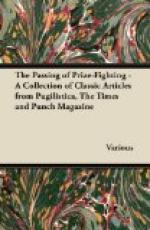THE QUEEN.—What have you done in the latter art to entitle you to such a distinction?
SIR ROBERT.—I have performed some very wonderful changes. When I was out of place, I had opinions strongly opposed to Catholic emancipation; but when I got into service I changed them in the course of a few days.
THE QUEEN.—I have heard that you boast of possessing a nostrum for the restoration of the public good. What is it?
SIR ROBERT.—Am I to consider myself “as regularly called in?”
THE QUEEN.—That is a question I decline answering at present.
SIR ROBERT.—Then I regret that I must also remain silent.
THE QUEEN (aside).—The wily fox! (aloud)—Are you aware that great distress exists in the country?
SIR ROBERT.—Oh, yes! I have heard that there are several families who keep no man-servant, and that numerous clerks, weavers, and other artisans, occupy second-floors.
THE QUEEN.—I have heard that the people are wanting bread.
SIR ROBERT.—Ha, ha! that was from the late premier, I suppose. He merely forgot an adjective—it is cheap bread that the people are clamouring for.
THE QUEEN.—And why can they not have it?
SIR ROBERT.—I have consulted with the Duke of Richmond upon the subject, and he says it is impossible.
THE QUEEN.—But why?
SIR ROBERT.—Wheat must be lower before bread can be cheaper.
THE QUEEN.—Well!
SIR ROBERT.—And rents must be less if that is the case, and—
THE QUEEN.—Well!
SIR ROBERT.—And that the landowners won’t agree to.
THE QUEEN.—Well!
SIR ROBERT.—And, then, I can’t keep my place a day.
THE QUEEN.—Then the majority of my subjects are to be rendered miserable for the advantage of the few?
SIR ROBERT.—That’s the principle of all good governments. Besides, cheap bread would be no benefit to the masses, for wages would be lower.
THE QUEEN.—Do you really believe such would be the case?
SIR ROBERT.—Am I regularly called in?
THE QUEEN.—You evade a direct answer, I see. Granting such to be your belief, your friends and landowners would suffer no injury, for their incomes would procure them as many luxuries.
SIR ROBERT.—Not if they were to live abroad, or patronise foreign manufactures: and should wages be higher, what would they say to me after all the money they have expended in bri—I mean at the Carlton Club, if I allow the value of their “dirty acres” to be reduced.
THE QUEEN.—Pray, what do you call such views?
SIR ROBERT.—Patriotism.
THE QUEEN.—Charity would be a better term, as that is said to begin at home. How long were you in your last place?
SIR ROBERT.—Not half so long as I wished—for the sake of the country.
THE QUEEN.—Why did you leave?




